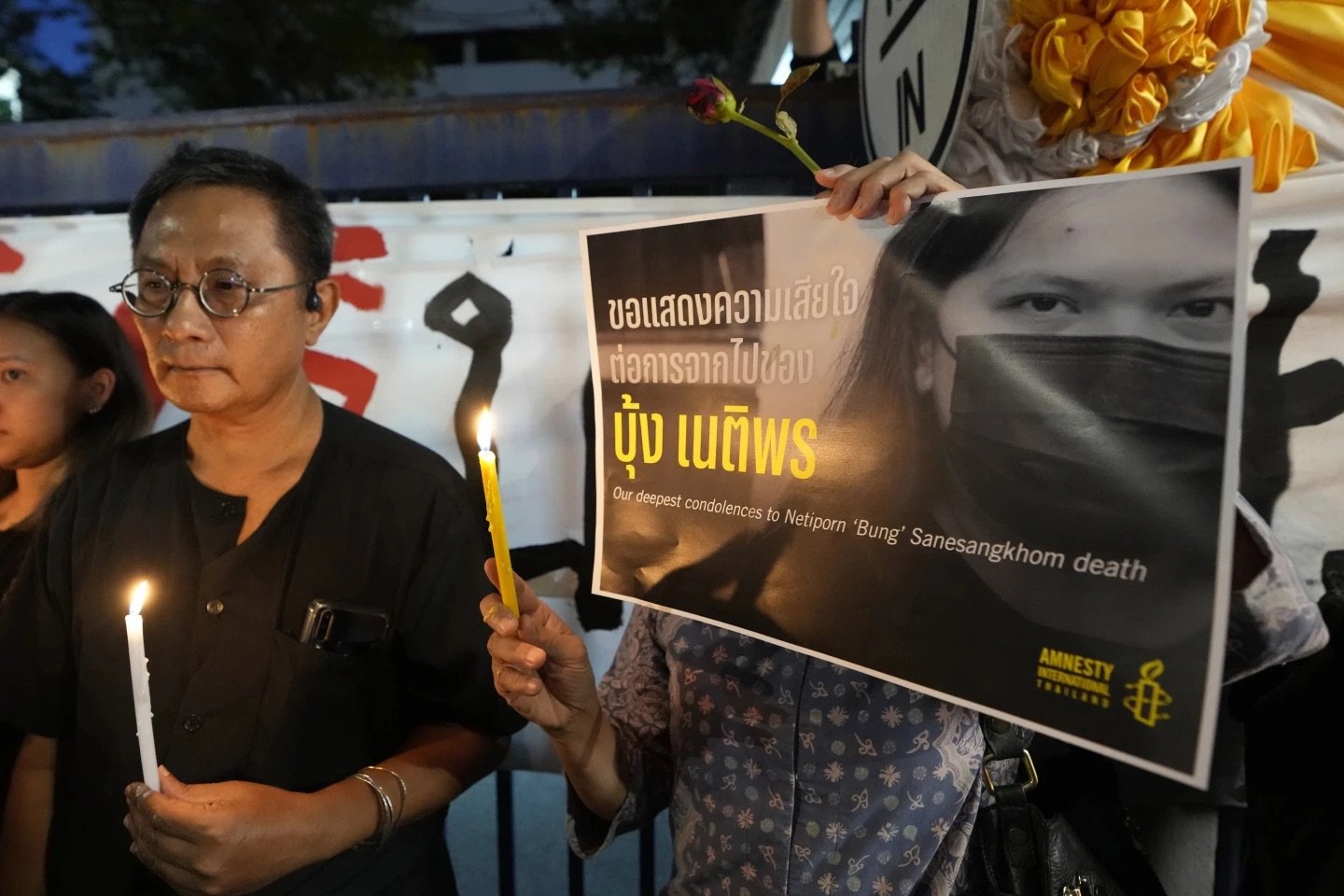Thai Activist Netiporn Sanesangkhom Dies After Hunger Strike Protesting Reform of Thailand’s Lèse-Majesté Law
Photo Credit: Sakchai Lalit/AP News
On May 14, political activist Netiporn “Bung” Sanesangkhom went into cardiac arrest while in pre-trial detention after a months-long hunger strike. She passed away at 11:22 AM GMT at the age of 28.
On Jan. 26, she was detained under Thailand’s lèse-majesté law. Section 112 of Thailand’s royal family criminal code states that “whoever defames, insults or threatens the King, the Queen, the Heir-apparent or the Regent, shall be punished with imprisonment of three to fifteen years.”
Thai authorities have interpreted this quite broadly. According to BBC News, commenting on the King’s dog, liking a social media post that is deemed critical of the monarchy, and even referring to certain events in Thailand's history have all been considered “insulting the monarchy”. After talking on a radio program in 2007 about slavery during the 1851–1868 reign of King Mongkut, a local politician was sentenced to two years in prison.
Filing a lèse-majesté complaint against someone else is also allowed. According to David Streckfuss, author of Truth on Trial in Thailand, police are required to follow up on all charges no matter what the complaint. Not doing so could put them at risk of lèse-majesté themselves. “The strength of lèse-majesté is that it’s unclear where its lines are. That’s its power,” said Streckfuss.
In 2014, Thailand's military took control in a coup, and since then, the country's law has become increasingly strict. Between 2014 and 2016, 24 per cent of people charged with the offence walked free. Over the next three years, that number fell to 10 per cent and last year, that figure was only at 4 per cent.
According to the United Nations (UN), most of the accused have been denied bail and some held for long periods in pre-trial detention. Over the years, the organization has expressed concern over Thailand's lèse-majesté law. In 2017, a press briefing note on Thailand was completed in Geneva, Switzerland, with its main focus being the rise of those prosecuted and the severity of sentencing.
“While our Office appreciates the complexity and sensitivity of the issue surrounding lèse majesté in Thailand, we are deeply troubled by the high rate of prosecutions and the courts’ persistence in handing down disproportionate sentences for the offence,” the UN wrote. “All people have the right to freedom of expression, including when it comes to criticising public figures.” They’ve brought to attention that the imprisonment of individuals who have exercised this right constitutes a violation of Article 19 of the International Covenant on Civil and Political Rights (ICCPR).
Activist organizations have characterized the lèse-majesté law as a political tool to silence those who are critical of the monarchy. “This is a shocking reminder that Thai authorities are harshly denying pro-democracy activists their freedom in an apparent bid to silence the peaceful expression of dissent,” Amnesty International Thailand Director Piyanut Kotsan said in a statement following Sanesangkhom’s death.
Prior to her detention in January, Sanesangkhom faced seven other legal cases and two charges for her activism. In 2022, she was charged for holding up posters that read: “Do you think the royal motorcade causes inconvenience or not?” and “Do you agree that the government allows the king to use power however he pleases?”
A member of the protest group Thalu Wang, which roughly translates to “shattering the palace”, and a participant in the nationwide 2020 youth-led protests, Sanesangkhom believed strongly in pushing for reform of Thailand’s powerful monarchy and lèse-majesté law.
According to The Guardian, just after her detention in January, she began a hunger strike to protest the jailing of political dissidents without bail — a strike that lasted till late April, during which she refused all food and water.
On May 14, Thai officials reported that her heart “stopped suddenly.” Thailand's Correctional Department stated that an autopsy would be conducted to determine the exact cause.
Former Thai Prime Minister Thaksin Shinawatra left Thailand in 2008 to avoid being prosecuted for conflict of interest, abuse of power, and corruption during his time in power. Upon returning in August 2023, he was taken into custody and given an eight-year sentence. Within days of his arrival, his jail term was reduced to a year by the king. Subsequently he was found eligible for early release due to age and health concerns. He was then granted bail.
Kritsadang Nutcharat, Sanesangkhom’s lawyer, stated that her treatment should be compared with that received by Shinawatra. “Why was she left to die? Why was it not urgent to get her treated [when she went on strike]? Because we requested it before.”
Thai Prime Minister Srettha Thavisin responded calling Sanesangkhom’s death a “tragic accident”, adding that he has ordered Thailand’s Ministry of Justice to investigate the circumstances surrounding it.
On May 14, a candlelight vigil was held outside the Southern Bangkok Criminal Court where people of all ages gathered to mourn her death. "Bung died, but her quest to see the change hasn't. […] we will continue our work to see it through for her," said pro-democracy leader Panusaya Sithijirawattanakul in a video posted on social media.

